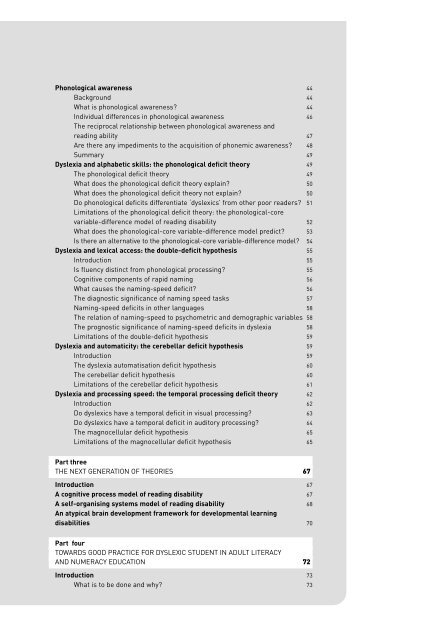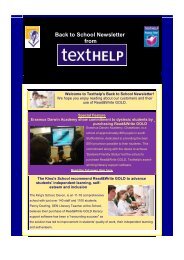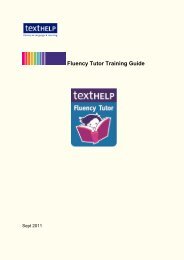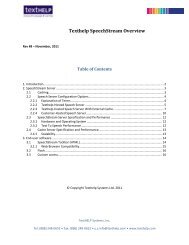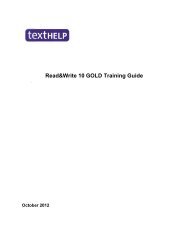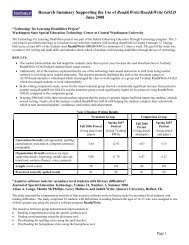01 NRDC Dyslexia 1-88 update - Texthelp
01 NRDC Dyslexia 1-88 update - Texthelp
01 NRDC Dyslexia 1-88 update - Texthelp
You also want an ePaper? Increase the reach of your titles
YUMPU automatically turns print PDFs into web optimized ePapers that Google loves.
Phonological awareness 44<br />
Background 44<br />
What is phonological awareness? 44<br />
Individual differences in phonological awareness 46<br />
The reciprocal relationship between phonological awareness and<br />
reading ability 47<br />
Are there any impediments to the acquisition of phonemic awareness? 48<br />
Summary 49<br />
<strong>Dyslexia</strong> and alphabetic skills: the phonological deficit theory 49<br />
The phonological deficit theory 49<br />
What does the phonological deficit theory explain? 50<br />
What does the phonological deficit theory not explain? 50<br />
Do phonological deficits differentiate ‘dyslexics’ from other poor readers? 51<br />
Limitations of the phonological deficit theory: the phonological-core<br />
variable-difference model of reading disability 52<br />
What does the phonological-core variable-difference model predict? 53<br />
Is there an alternative to the phonological-core variable-difference model? 54<br />
<strong>Dyslexia</strong> and lexical access: the double-deficit hypothesis 55<br />
Introduction 55<br />
Is fluency distinct from phonological processing? 55<br />
Cognitive components of rapid naming 56<br />
What causes the naming-speed deficit? 56<br />
The diagnostic significance of naming speed tasks 57<br />
Naming-speed deficits in other languages 58<br />
The relation of naming-speed to psychometric and demographic variables 58<br />
The prognostic significance of naming-speed deficits in dyslexia 58<br />
Limitations of the double-deficit hypothesis 59<br />
<strong>Dyslexia</strong> and automaticity: the cerebellar deficit hypothesis 59<br />
Introduction 59<br />
The dyslexia automatisation deficit hypothesis 60<br />
The cerebellar deficit hypothesis 60<br />
Limitations of the cerebellar deficit hypothesis 61<br />
<strong>Dyslexia</strong> and processing speed: the temporal processing deficit theory 62<br />
Introduction 62<br />
Do dyslexics have a temporal deficit in visual processing? 63<br />
Do dyslexics have a temporal deficit in auditory processing? 64<br />
The magnocellular deficit hypothesis 65<br />
Limitations of the magnocellular deficit hypothesis 65<br />
Part three<br />
THE NEXT GENERATION OF THEORIES 67<br />
Introduction 67<br />
A cognitive process model of reading disability 67<br />
A self-organising systems model of reading disability 68<br />
An atypical brain development framework for developmental learning<br />
disabilities 70<br />
Part four<br />
TOWARDS GOOD PRACTICE FOR DYSLEXIC STUDENT IN ADULT LITERACY<br />
AND NUMERACY EDUCATION 72<br />
Introduction 73<br />
What is to be done and why? 73


